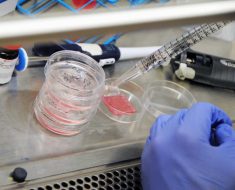A new combination therapy to combat cancer could one day consist of a plant virus and an antibody that activates the immune system’s “natural killer” cells, shows a study by researchers at the University of California San Diego.
In mouse models of colon cancer, the combination therapy eliminated all tumors and prevented their recurrence, which in turn resulted in 100% survival. The therapy also increased survival in mouse models of melanoma.
The work is reported in a paper published June 17 in Nano Letters.
The proof-of-concept therapy enhances the activity of cancer killing immune cells known as natural killer cells, which naturally reside in the body and in tumors. The job of natural killer cells is to target and destroy cancer cells — in doing so, they release molecules called antigens that the immune system can recognize and produce antibodies against.
The problem is that there are not enough natural killer cells in or near cancerous tumors to be effective. And those that are in the tumors cannot do their job because cancer cells can secrete molecules that bind to natural killer cells and suppress them.
The therapy overcomes these problems using two key ingredients: cowpea mosaic virus, which is a plant virus that infects legumes but is harmless to animals and humans, and an antibody called anti-4-1BB. Cowpea mosaic virus has a special ability to attract natural killer cells to the tumor microenvironment, while anti-4-1BB binds to receptors on these cells to snap them out of their immunosuppressed state. By joining forces, the plant virus and antibody not only draw a large enough crowd of natural killer cells to the tumors, but also fire them up for attack.
Source: Read Full Article



